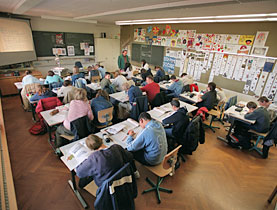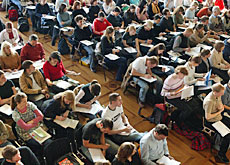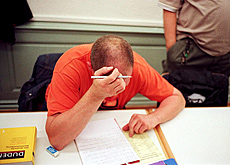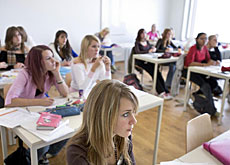Swiss receive good report in school survey

Switzerland's students have received a good report in the latest international comparisons, with excellent marks in mathematics.
However, a senior education official downplayed the relevance of the study by the Organisation for Economic Cooperation and Development (OECD).
Isabelle Chassot, who heads the Conference of Cantonal Education Directors, warned in Bern on Tuesday that even though pupils were asked the same set of questions in 57 countries, the study should not be seen as a competition.
She said the OECD skills rankings were of limited value as they did not take into account the different demographic, social and cultural backgrounds in the various countries.
This is the third round of results in the Programme for International Student Assessment (Pisa). The first round in 2000 caused a furore in Switzerland after it revealed shortcomings in reading compared with other industrialised nations.
After making improvements in reading in the second survey in 2003, Swiss pupils have been rated above average for the first time in the 2006 survey, with 499 points compared with the OECD average of 494 points.
In 2006 the Swiss scored 512 points in natural sciences – the focus theme of the report – and are in the top 13, safely above the OECD average of 500 points.
As in previous studies the 15-year-old students in Switzerland did particularly well in mathematics. They scored 530 in the latest study, far above the average of 498.
About 12,000 students took part in the 2006 Pisa tests in Switzerland. Overall there were 400,000 participants from 57 countries.
“No surprises”
Chassot said there were no surprises in the results. “I am satisfied with the results to the extent that there is no deterioration. We can see that we are going in the right direction and at the same time the system shows us the weak points that we were already aware of,” she told swissinfo.
On the subject of reading, Chassot said that early intervention was important. “Lowering the school entry age to four will make it easier for us to take account of the individual difficulties of all the children to improve their reading skills.”
Dieter Rossboth, deputy director of the Federal Statistics Office, pointed out that certain factors played a role in determining skills, particularly in sciences.
“There is a strong link in the socio-economic background and skills in sciences. But this is also very much linked with problems with language skills, as science skills go hand in hand with language skills,” he told swissinfo.
Integration
With reference to the high number of pupils of foreign language background, Chassot said that Swiss schools also had an important role to play in integrating young foreigners into society.
Overall in the survey, ten per cent of Swiss pupils were classed as “very good” and 16 per cent were classed as “weak”, compared with the OECD average of 19 per cent.
There were also differences between the sexes, with boys scoring better than girls in science and girls outdoing boys in reading.
“We also see this in girls’ career choices, which are still underrepresented in the technical and scientific fields. It is up to society as a whole to show that these careers are open to girls as much as to boys,” Chassot said.
swissinfo with agencies

More
Conference of Cantonal Ministers of Education
Swiss pupils scored above average in the three Pisa categories: (Swiss score, OECD average)
Mathematics 530, 498
Science 512, 500
Reading 499, 492
57 countries were surveyed for the 2006 study.
Based on tests carried out among 400,000 students in 57 countries in 2006, the latest Pisa survey focuses particularly on students’ abilities in comprehending and tackling scientific problems.
It also provides an update on performance in reading and mathematics compared with surveys in 2000 and 2003.
The top performer in science in Pisa 2006 was Finland, followed by Hong Kong-China, Canada, Chinese Taipei, Estonia, Japan and New Zealand. Finland was the best performing European country in all three categories.
In 2006 the Swiss approved a proposal to reform the education system, which has been traditionally locally managed by each of the country’s 26 cantons.
Under the new more centralised structure coordination among the different systems is to be improved and the federal agencies get a bigger say.
The reforms include streamlining the length of compulsory schooling and the school starting age, as well as the mutual recognition of diplomas across cantonal borders.

In compliance with the JTI standards
More: SWI swissinfo.ch certified by the Journalism Trust Initiative



You can find an overview of ongoing debates with our journalists here. Please join us!
If you want to start a conversation about a topic raised in this article or want to report factual errors, email us at english@swissinfo.ch.